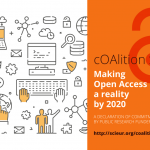Featuring a summary of the Open Pharma team’s trip to Evidence-Based Medicine Live 2019, the potential use of Literature Programming to improve research transparency, a new data depot project in India and the lack of institutional incentives for researchers to publish open access
Evidence-Based Medicine Live 2019 via EBMLive
Patients should and want to be involved in each stage of a clinical trial. This was the resounding message from the second day of Evidence-Based Medicine Live (EBMLive), which took place from 15 to 17 July 2019, in Oxford, UK. Representatives from publishing companies, academia, the pharma industry, patient advocacy groups and the medical community came together to give and participate in a series of engaging presentations and interactive sessions. A compelling talk from patient campaigners underlined the need for researchers to include clear conflicts of interest in published work. Conflicts of interest continued to be the main theme of the final day, with talks discussing their past, present and future. A highlight was the interactive group session that enabled attendees to detail the most important issues they face when it comes to disclosing conflicts of interest and to suggest potential solutions for resolving them. A full report on
EBMLive 2019 will be posted on the Open Pharma website soon!
The questionable transparency of research papers via EBMLive
New research methods and medical treatments are constantly being developed, explored and revised. So why isn’t the way in which research is communicated updated accordingly? Whether a manuscript was published in the 1900s or in 2019, it follows the IMRaD (Introduction, Method, Results and Discussion) model, presenting a highly polished overview of the key findings. Much of the work that goes into generating the results is missing, and often the only way to get detailed methodological information is to contact authors directly. This article recommends an alternative approach,
‘Literature Programming’, which produces manuscripts embedded with code to create a paper containing all the data required for the research to be transparent and reproducible without exceeding the journal’s maximum word limit.
Is the new data depot project in India legal? via Nature
When it comes to data accessibility, Carl Malamud is a man on a mission – he aims to free scientific information stuck behind paywalls. In a recent collaboration with researchers at Jawaharlal Nehru University in India, Carl and his team extracted text and figures from over 70 million research articles without the publisher’s permission. Although it is illegal to download and read these papers, data mining to scan and pull out relevant knowledge using a computer program is not a breach of copyright in the India, the USA or the UK, provided the information scanned comes from legal sources. Many researchers are excited by the prospect of being able to freely access key findings. Publishers, on the other hand, may have a slightly different opinion, with some stating that researchers would need their permission to mine data from papers published in their journals.
Misconceptions about open access publishing in academia via LSE Impact Blog
The lack of institutional incentives to make research outputs universally accessible may often prevent academic researchers from engaging with the open access movement. A recent survey of the review, promotion and tenure policies of 129 universities across the USA and Canada revealed that only 5% of these policies reference open access. Many of the statements in these policies feature concerns that articles published open access are only available in either predatory or low-quality journals. This raises the question of how academics can be expected to engage in open access practices when they receive little to no encouragement from their institutions.






